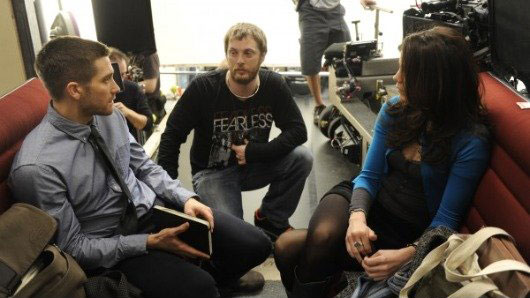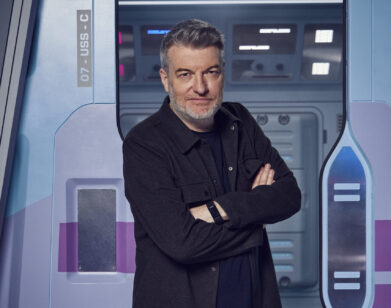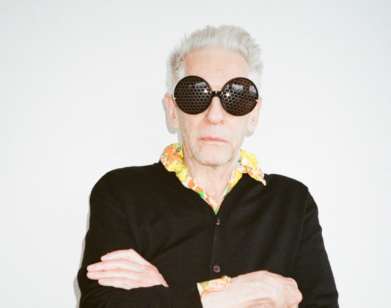Straight from the Source: Duncan Jones on Humor, Jake Gyllenhaal, and Dad David Bowie

DUNCAN JONES (CENTER) WITH JAKE GYLLENHAAL AND MICHELLE MONAGHAN ON THE SET OF SOURCE CODE. PHOTO COURTESY OF SUMMIT ENTERTAINMENT
In Source Code, Duncan Jones’ follow-up to Moon, Captain Colter Stevens (Jake Gylenhaal) comes to on a commuter train headed for Chicago with no recollection of how he got there. What’s more, he’s trapped in another man’s body—a schoolteacher named Sean Fentress. Moments later, the train explodes and Stevens is shaken into consciousness again; this time wearing his army fatigues and strapped into a dimly lit, hollowed-out metal pod with piles of wires at his feet. Captain Goodwin (Vera Farmiga) appears on a tiny screen and briefs him on his mission: a classified military program that enables body substitution will hurl Stevens back into the train to spot a terrorist and prevent a future attack. Added caveat? He has eight minutes—that recur like hawkish déjà-vu—in which to do so.
Jones, whose genre-bending, mind-bending, sci-fi film opens today, spoke with Interview about Source Code and how humor, Hitchcock, and quirk played a vital role. He also shared some sage advice passed on to him from his dad, David Bowie, “which was [both] a gift and a curse.”
DURGA CHEW-BOSE: One of the questions I asked Jake during the roundtable interviews was about the film’s lack of cynicism despite it being a cerebral sci-fi. At first it’s a bit disarming, and I was hoping you might speak to your choice to have some of that “save the world” stuff, and your choice to keep a lot of the dialogue light and funny.
DUNCAN JONES: Absolutely. Well, I think you’re absolutely right to talk about both of those things, because the humor to me was the key tool; the lightening of the tone, I think, is what made it not come across as pretentious. It is kind of a strange conceit, this setup of the source code and how that might work and what it means. When I was reading the script, I was thinking, “Well, you got one of two ways to go here: you can either spend most of your time in exposition trying to explain the technology or you just ask the audience to buy into this and enjoy the story.” And if you’re going to do that, I think humor is a huge tool, an incredibly useful tool to get the audience to form an attachment with these characters. If your main character and your audience are both laughing about the same thing—you know, if there’s comedy and it’s shared—I think it helps the audience bond with the protagonist.
CHEW-BOSE: Yeah, we don’t feel like we’re being talked down to, even in those brainier, more analytical parts.
JONES: Yes, yes. Absolutely.
CHEW-BOSE: I didn’t feel the need with Source Code to get too caught up with all the logistics. Jake’s jokes as Captain Colter Stevens keep the movie on the thrilling side of sci-fi rather than the analytic.
JONES: I mean, I was a huge fan of Jake, still am a huge fan, and I really wanted to work with him. And one of the many things I love about Jake is that he’s one those actors that when he’s on the screen you can empathize with him; you just really want him to do well. It’s the same with Sam Rockwell, which is why I think they make great leading men, although Sam’s had a lot less opportunities. But I think you know, you want to be on Jake’s side, and he’s smart, almost like those old Indiana Jones films where Harrison Ford is kind of this Everyman character who’s getting frustrated by everyone in the world around him, and you just can’t help rooting for him. And that’s what Jake is good at, and I think that’s what we got in the film.
CHEW-BOSE: I was going to ask about Moon, in terms of both of your features having similar ideas related to that fenced-in kind of isolation, and not necessarily reserved only for the sci-fi side of things, but also in your characters’ daily lives. What draws you to those types of characters?
JONES: I love the idea—well, maybe not love, but I feel a certain affinity for the idea that you may think you know who you are but everyone else sees you as someone else or in a different way, and what does that actually mean about your identity? Who are you? Are you are you think you are? Or are you who everyone else thinks you are? And I think we played around with that in Moon and Source Code, and I do find it fascinating. I also find it something that I think everyone, on some level or another, can identify with.
CHEW-BOSE: Can you speak to some of the influences you had in making the film? It mixes many genres, and not just in story, but also anything from the costumes to the music, to the Hitchcock style of suspense. I’ll go as far as saying I even had a moment at the very start when I thought, “Wait! This is going to turn out like Murder on the Orient Express, and everyone’s involved and in on it!”
JONES: [laughs] Sure, sure. Absolutely. You’re right, and you’re right to pick up on the fact that Jake really is sort of is on his own in the way that really seems to fit that Hitchcock mold. As far as other elements, there’s the train station as well, and we’ve got this clock tower, and we have this beautiful score that Chris P. Bacon did. When we were talking to him about what we wanted and we played him some of our temp pieces, Hitchcock came up. And also it’s sort of quirky—there’s a sense of anticipation.
CHEW-BOSE: On a more personal note, in terms of you as a filmmaker, it took you some time to really figure out what it was you wanted to do with your life—you jumped from many different areas and then finally found filmmaking as something you’re good at doing and can share with the world.
JONES: It felt like it was going to take the rest of my life to figure it out, and fortunately, I went through some hard times where I really felt very frustrated and upset, and mad at myself that I couldn’t find something I felt really passionate about, and eventually I did. It’s a huge relief, is what it is more than anything else, to know that you don’t have to continue that search and that frustration. My dad is an amazing and lovely man, and he gave me some advice early on in my life which was a gift and a curse, which was to find the thing you feel passionate about. And the problem with that is if you don’t find it you’re going to beat up on yourself. And I don’t know, because I did find something that I feel passionate about, I never had to deal with that really long-term, that sense of loss of not having achieved, of not finding that thing. But I lived with it for long enough to know how it can wear down on you. To be honest, most of Moon is about that experience. So yeah, it’s something that feels very personal and it’s something I can really relate to.
CHEW-BOSE: Is that why identity in general, and a sense of self, is a theme you return to?
JONES: Yeah. Absolutely. That’s what that experience is in summary—it’s working out who you are. Finding your passion is finding out who you are.
SOURCE CODE IS OUT IN THEATERS TODAY.






